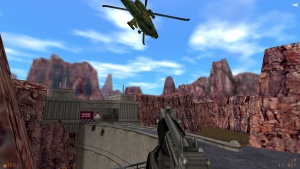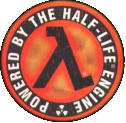GoldSrc: Difference between revisions
m (→SDK: Added Hammer 3.5) |
(→Games using GoldSrc: added notes) |
||
| Line 26: | Line 26: | ||
!Developer(s) | !Developer(s) | ||
!Publisher(s) | !Publisher(s) | ||
!Notes | |||
|- | |- | ||
| 1998 | | 1998 | ||
| Line 31: | Line 32: | ||
| [[Valve]] | | [[Valve]] | ||
| rowspan="2" | Sierra Entertainment, Valve (digital) | | rowspan="2" | Sierra Entertainment, Valve (digital) | ||
| First game to use the GoldSrc engine. | |||
|- | |- | ||
| rowspan="3" | 1999 | | rowspan="3" | 1999 | ||
| {{hlop4|4}} | | {{hlop4|4}} | ||
| [[Gearbox Software|Gearbox]], Valve | | [[Gearbox Software|Gearbox]], Valve | ||
| | |||
|- | |- | ||
| {{tfc|4}} | | {{tfc|4}} | ||
| Valve | | Valve | ||
| Valve, Sierra Entertainment (digital) | | Valve, Sierra Entertainment (digital) | ||
| | |||
|- | |- | ||
| {{svencoop|4}} | | {{svencoop|4}} | ||
| Sven Co-op team | | Sven Co-op team | ||
| Sven Co-op team | | Sven Co-op team | ||
| GoldSrc was later forked into Svengine since 5.0, which was slightly different than GoldSrc, and has support<br>for Hor+ FOV, better audio via FMOD, and so on... | |||
|- | |- | ||
| rowspan="3" | 2000 | | rowspan="3" | 2000 | ||
| Line 48: | Line 53: | ||
| Valve | | Valve | ||
| Sierra Entertainment | | Sierra Entertainment | ||
| | |||
|- | |- | ||
| ''[[Gunman Chronicles]]'' | | ''[[Gunman Chronicles]]'' | ||
| Rewolf Entertainment | | Rewolf Entertainment | ||
| Sierra Entertainment | | Sierra Entertainment | ||
| | |||
|- | |- | ||
| {{ricochet|4}} | | {{ricochet|4}} | ||
| rowspan="2" | Valve | | rowspan="2" | Valve | ||
| rowspan="2" | Valve | | rowspan="2" | Valve | ||
| | |||
|- | |- | ||
| rowspan="3" | 2001 | | rowspan="3" | 2001 | ||
| {{dmc|4}} | | {{dmc|4}} | ||
| | |||
|- | |- | ||
| {{hlbs|4}} | | {{hlbs|4}} | ||
| Gearbox, Valve | | Gearbox, Valve | ||
| Sierra Entertainment, Valve (digital) | | Sierra Entertainment, Valve (digital) | ||
| | |||
|- | |- | ||
| ''[[Half-Life: Decay]]'' | | ''[[Half-Life: Decay]]'' | ||
| Gearbox | | Gearbox | ||
| Sierra Entertainment | | Sierra Entertainment | ||
| | |||
|- | |- | ||
| 2002 | | 2002 | ||
| Line 72: | Line 83: | ||
| Eurocom, Gearbox | | Eurocom, Gearbox | ||
| Electronic Arts | | Electronic Arts | ||
| | |||
|- | |- | ||
| rowspan="3" | 2003 | | rowspan="3" | 2003 | ||
| Line 77: | Line 89: | ||
| Valve | | Valve | ||
| Activision, Valve (digital) | | Activision, Valve (digital) | ||
| | |||
|- | |- | ||
| {{csxbox|4}} | | {{csxbox|4}} | ||
| [[Ritual|Ritual Entertainment]], [[Turtle Rock Studios]] | | [[Ritual|Ritual Entertainment]], [[Turtle Rock Studios]] | ||
| Xbox Game Studios (formerly Microsoft Studios) | | Xbox Game Studios (formerly Microsoft Studios) | ||
| | |||
|- | |- | ||
| ''Counter-Strike Neo'' | | ''Counter-Strike Neo'' | ||
| Namco | | Namco | ||
| Namco | | Namco | ||
| | |||
|- | |- | ||
| 2004 | | 2004 | ||
| Line 90: | Line 105: | ||
| Valve, Ritual Entertainment, Gearbox, Turtle Rock Studios | | Valve, Ritual Entertainment, Gearbox, Turtle Rock Studios | ||
| Sierra Entertainment, Valve (digital) | | Sierra Entertainment, Valve (digital) | ||
| | |||
|- | |- | ||
| 2008 | | 2008 | ||
| Line 95: | Line 111: | ||
| Valve, Nexon | | Valve, Nexon | ||
| Nexon | | Nexon | ||
| | |||
|- | |- | ||
| 2013 | | 2013 | ||
| Line 100: | Line 117: | ||
| Team Psykskallar | | Team Psykskallar | ||
| Team Psykskallar | | Team Psykskallar | ||
| | |||
|- | |- | ||
| 2014 | | 2014 | ||
| Line 105: | Line 123: | ||
| Valve, Nexon | | Valve, Nexon | ||
| Nexon | | Nexon | ||
| Last official game to use the GoldSrc engine. | |||
|- | |- | ||
|} | |} | ||
Revision as of 04:09, 27 April 2023
![]() GoldSrc (also known as GoldSource) is a 3-D video game engine created by Valve in 1996. It was the driving force behind many famous games of the late 90s, such as Half-Life, Team Fortress Classic, and Counter-Strike. GoldSrc is a heavily modified version of the Quake engine, and runs on C++ programming code. GoldSource and its level editor, the Hammer World Editor, were released by Valve for public use, making it the source of countless community-made modifications. GoldSrc was replaced by its sequel engine, Source, in 2004, which currently holds 1st place as the choice for modders. Though GoldSrc is past its prime, many gamers still seek to use it for mods and level design.
GoldSrc (also known as GoldSource) is a 3-D video game engine created by Valve in 1996. It was the driving force behind many famous games of the late 90s, such as Half-Life, Team Fortress Classic, and Counter-Strike. GoldSrc is a heavily modified version of the Quake engine, and runs on C++ programming code. GoldSource and its level editor, the Hammer World Editor, were released by Valve for public use, making it the source of countless community-made modifications. GoldSrc was replaced by its sequel engine, Source, in 2004, which currently holds 1st place as the choice for modders. Though GoldSrc is past its prime, many gamers still seek to use it for mods and level design.

Features
- AI flocking - NPCs can group together, seen with Houndeyes;
- Skeletal animation - allowing for easier animating of models;
- Colored lighting - Quake simply had monotone lighting;
- Scripted sequences - Used extensively to tell Half-Life's story;
- Transparent textures - Glass can now be used in maps;
- Higher poly counts - GoldSrc allows for far more detailed models than Quake.
SDK
The GoldSrc SDK is known as the Half-Life SDK. As of August 2013, it is available on Steam under the "Tools" section. With it comes Hammer 3.4, the 3ds Max sources for many cut and retail NPCs as well as player and weapon models, tools for packing textures into WADs, and detailed documentation on implementing baseline features such as voice chat into a mod.
The full source code for the SDK can be found on Valve's Github Page.
Games using GoldSrc
| Year | Title | Developer(s) | Publisher(s) | Notes |
|---|---|---|---|---|
| 1998 | Valve | Sierra Entertainment, Valve (digital) | First game to use the GoldSrc engine. | |
| 1999 | Gearbox, Valve | |||
| Valve | Valve, Sierra Entertainment (digital) | |||
| Sven Co-op team | Sven Co-op team | GoldSrc was later forked into Svengine since 5.0, which was slightly different than GoldSrc, and has support for Hor+ FOV, better audio via FMOD, and so on... | ||
| 2000 | Valve | Sierra Entertainment | ||
| Gunman Chronicles | Rewolf Entertainment | Sierra Entertainment | ||
| Valve | Valve | |||
| 2001 | ||||
| Gearbox, Valve | Sierra Entertainment, Valve (digital) | |||
| Half-Life: Decay | Gearbox | Sierra Entertainment | ||
| 2002 | James Bond 007: Nightfire | Eurocom, Gearbox | Electronic Arts | |
| 2003 | Valve | Activision, Valve (digital) | ||
| Ritual Entertainment, Turtle Rock Studios | Xbox Game Studios (formerly Microsoft Studios) | |||
| Counter-Strike Neo | Namco | Namco | ||
| 2004 | Valve, Ritual Entertainment, Gearbox, Turtle Rock Studios | Sierra Entertainment, Valve (digital) | ||
| 2008 | Counter-Strike Online | Valve, Nexon | Nexon | |
| 2013 | Cry of Fear | Team Psykskallar | Team Psykskallar | |
| 2014 | Counter-Strike Nexon: Studio | Valve, Nexon | Nexon | Last official game to use the GoldSrc engine. |
See also
- For information about converting GoldSrc content to the Source engine, see Porting Goldsource content to Source.
- GoldSrc on Wikipedia
- GoldSource SteamPipe Directories
